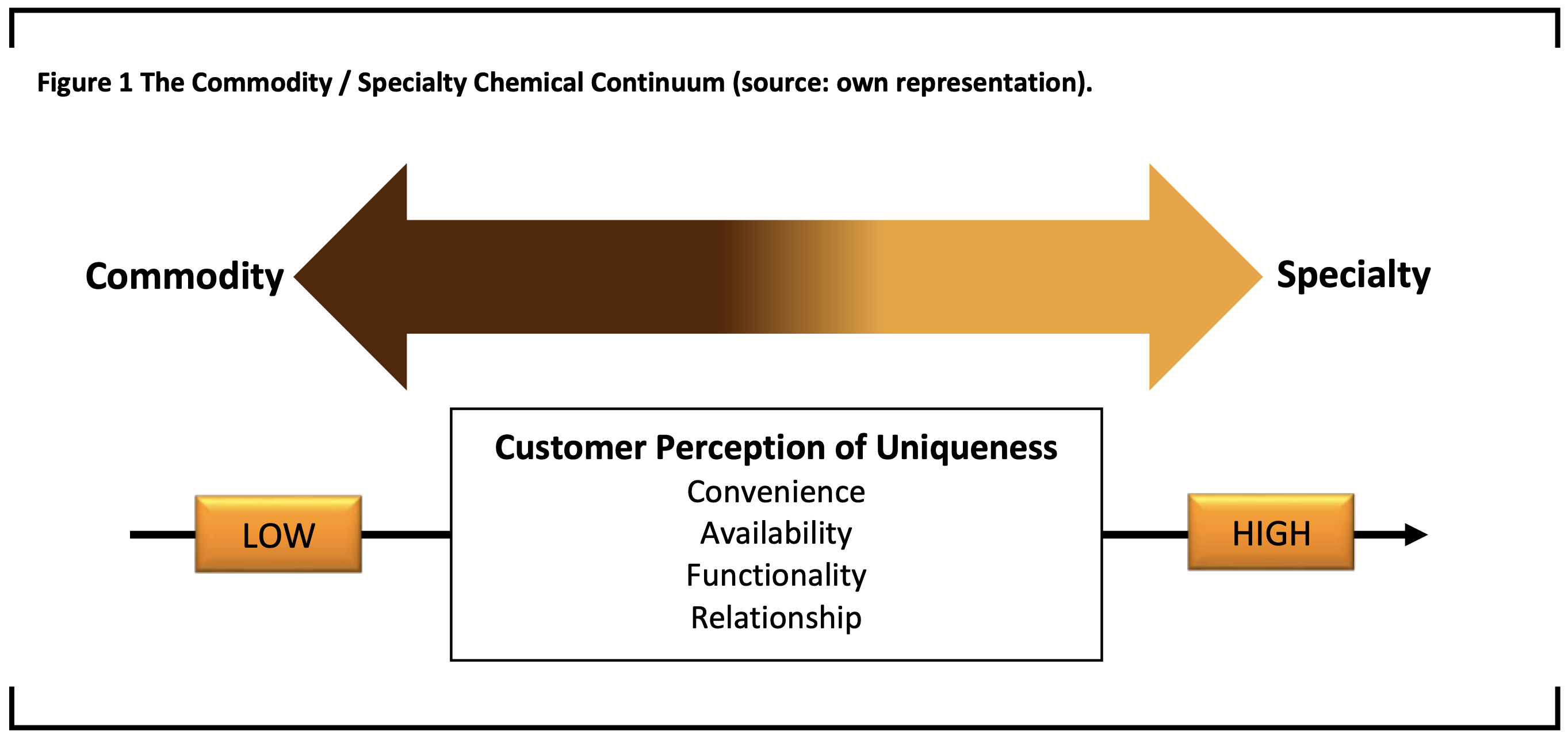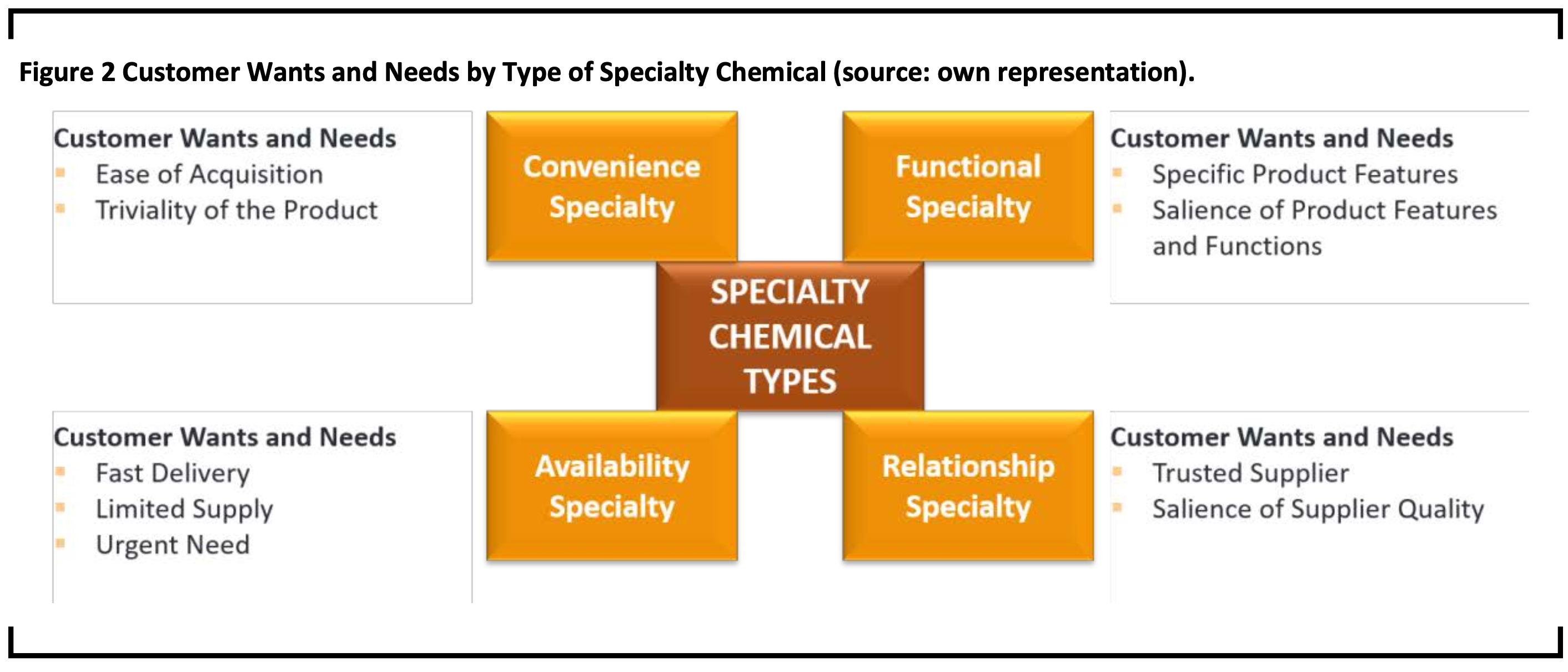Specialty chemicals and contending with forces of change
Over the past decade, the chemical industry has experienced increased competition, declining margins, shorter product life cycles and subsequently a strong tendency towards product commoditization. In response to these challenging circumstances, chemical companies have adjusted their portfolios towards a higher degree of specialty chemicals.
Specialty chemicals and materials are products manufactured by the chemical industry that differ significantly from commodity chemicals and plastics. Distinguishing characteristics of specialty chemicals include quicker responsiveness to market and customer needs as well as higher required levels of technical service and application expertise. Customer perception of uniqueness places commodity chemicals and specialty chemicals at the extreme ends of a product continuum as illustrated in Figure 1.
Commodity chemicals are sold on the basis of their chemical composition and specifications, which are generally without differentiation across many producers. Some commodity materials have high entry barriers due to:
- Scale of assets – giving low unit costs and/or requiring high capital investment
- Hazardous nature and/or onerous health, safety and environmental compliance requirements
- Requirements for grades with high purity and/or different product forms
- Logistics system constraints or costs
Alternatively, specialty chemicals generally utilize commodities as feedstocks, and are significantly smaller in scale of operation. Specialties exhibit a mixture of characteristics that distinguish them from commodities:
- Product characteristics and performance are differentiated from competitors, usually branded, and require technical support service
- Substitution is difficult, risky, or costly due to the performance of the material in customers’ own products
- Value pricing, rather than cost plus pricing, results in selling prices that are less dependent on industry utilization levels and fluctuating raw materials, utilities, or logistics costs
Specialty chemicals are categorized as either performance or fine chemicals. Performance chemicals are typically sold to customers on the basis of their functionality. Moreover, buyers expect suppliers to understand the functional systems with which their chemical products interact. Fine chemicals are typically the products of several stages of sophisticated chemical/biological synthesis, but are sold, like commodities, on the basis of chemical composition and specifications. Fine chemicals are often sold and used as intermediates to synthesize other chemicals. Further, fine chemicals are sold on the basis of composition because the buyer generally has sufficient knowledge about functional performance and does not require technical assistance from the supplier.
Customer perception of uniqueness is based on a product’s convenience, availability, functionality, and the interrelationship developed between the buyer and the seller. Buyers will view their suppliers’ base from different vantage points based on wants and needs, and thus will often determine what is a specialty and what is a commodity. Customers’ wants and needs are highlighted in Figure 2 along with the type of specialty chemical required.
The specialty chemical industry has undergone many transformative changes over the past decade, including considerable realignment across the value and supply chains. Although the industry has mounted a concerted effort toward globalization, there has been significant consolidation evidenced by numerous mergers, acquisitions, divestitures, and joint ventures of companies varying in size and reach. In addition, external trends such as population, demographics, HSE (health, safety, and environmental) regulations, technological improvements, changing life styles, and rising standards of living ex-ert significant influences on the current and future demand for specialty chemicals.
Generally, specialty companies command higher valuations because specialty products realize higher margins due to differentiation, which comes at a significant price premium over commodities. However, specialty chemical company valuations are challenged by the following issues:
- Alignment of their client base with optimal lev- els of service and associated costs-to-serve
- Adjustments to existing supply chains and product distribution channels as well as development of new and viable channels
- Downward pressure on margins of mature, less specialized products, services, and systems as markets develop
- Alternative means for advertising, marketing, and selling such as through e-commerce
- Higher failure rate, and higher costs, associated with new product and business development
- Capture of increased value created from new product introductions
- Impact of scale on inherent competitive advantage
- Focus on higher shareholder value, with emphasis on increasing profitability and capital productivity
Therefore, specialty chemical companies that seek sustainable growth, improved profitability, and continuous operational improvement must address and incorporate strategies and tactics into their business plans to contend with these forces of change.

